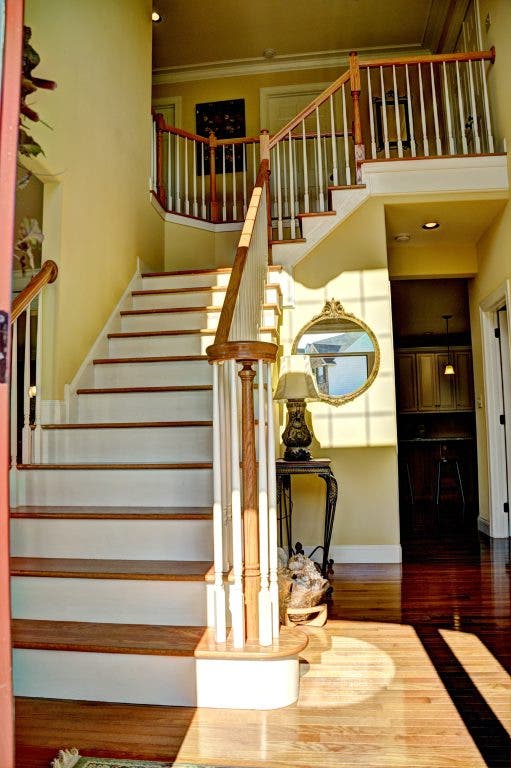Real Estate
Does Your House Have Good Feng Shui?
Lisa Loper of the Scott Loper Team looks at an ancient Chinese art.
Feng Shui (fǝn shwā) noun: Literally translated means wind water - It is the ancient Chinese practice of positioning objects, such as buildings and furniture, based on a belief that the patterns of yin and yang and the flow of chi (energy) will have positive and negative effects on your life.
To create positive Feng Shui in your home, you must allow for a free flow of chi (the energy which permeates the environment - when energy is in disarray, misfortunes rule the day) and have the yin and yang in a perfect cosmic balance. The yin and yang energies “dance” together continually striving for the balance that brings harmony. That harmony will result in a happier life, love, success and wealth.
Yin is stillness - cool, dark, lifeless.
Find out what's happening in Montgomeryville-Lansdalewith free, real-time updates from Patch.
Yang is movement - hot, bright, full of life.
Critical elements for good Feng Shui in a home include the use of mirrors, crystals, water features, wind chimes, plants, fresh flowers, and bowls of fresh fruit.
Find out what's happening in Montgomeryville-Lansdalewith free, real-time updates from Patch.
A few common Feng Shui elements include:
Tall wide plants - diffuse the energy so it flows into every nook and cranny.
Mirrors - help to reflect and move energy throughout the home. They also absorb negative energy.
Water features (i.e. fountains, waterfalls, and aquariums) - promote relaxation and create the essential wind/water harmony.
Colors - every room needs a good balance of cool, neutral colors and colorful accents to create harmony. A predominant use of warm and calming colors is best to promote relaxation.
Furniture placement - should be placed so there is a natural pathway/flow through every room. Round tables especially with a vase of fresh or silk flowers help to distribute the energy. Chairs and couches should be positioned so one can sit with their back to a wall.
Repairs - should be made promptly. Disrepair and unfinished projects emit negative energy and cause stress.
No No’s for good Feng Shui:
Clutter - wrecks havoc on the flow of energy and causes tension, disorganization, and cluttered thinking. Anything that is broken, unused or resurrects unhappy memories should be thrown out.
Bedroom offices - work and rest don’t mix. Keep your office out of your bedroom.
Mirrors facing the bed - may channel too much energy to you while you are sleeping. This will cause over stimulation and a poor night of rest.
Mirrors facing the front door - will bounce the energy flowing into the home right back out.
Overhead beams - press negative energy downward (but hanging a wind chime from the beam can help as a large flow of energy will cause the chime to alert you).
Sharp corners and irregular shapes - prevent calmness and relaxation. Rounded edges are preferred as sharp corners emit negative energy and should never point towards a bed or sitting area. Irregular shapes create a sense of disorder.
Dried flowers - fresh or silk flowers are best. Dried flowers are not considered “auspicious” and will undermine your success.
Electric devices in the bedroom - digital clock radios, televisions, and cordless phones all emit light and electrical energy that are disruptive to sleep.
The “Mouth of Chi” is Your Front Door
The front door is critical because in the art of Feng Shui, that is where all the energy flows into the house.
For a South facing house, the door should be the color of fire (i.e. red, orange, yellow, purple, or pink) or wooden (to feed the fire). A North facing house should be a cool color such as black or blue.
A red front door is a favorite in Chinese tradition; it represents prosperity, happiness and good fortune.
Your front door should also be in proportion to the size of your home so the right amount of chi flows into the home. A large home should have a commanding front door or double doors, but a smaller home should have a smaller door.
All front doors should be well maintained, decorative with beautiful hardware, and free of clutter or obstacles.
A stairway right at the front door is considered bad Feng Shui as the energy will rush up (or down) the stairs leaving the main floor lacking energy and nourishment.
A mirror should never face the front door as the energy will bounce back out of the home as it tries to enter. However, mirrors in a home (and foyer) are good for helping chi to flow freely.
A water feature near the front door creates good Feng Shui as wind meets water as soon as it enters the house.
The rugs used at your front door can affect the Feng Shui. Never use an image that shouldn’t be stepped on (such as angels or birds) and do not use rugs with the family name or emblem on it.
The front and back door should not align. If they do, energy that flows through the front door will escape out the back before circulating throughout the home.
Slow down the energy as it approaches your front door. Curved front walkways that meander accomplish this. And front doors should never face oncoming roads such as a T-junction or the end of a street or cul-de-sac. If they do, plant a row of trees or hedges or place a fence to help slow the energy.
The Scott Loper Team includes Scott & Lisa Loper, Keller Williams Real Estate, 601 Bethlehem Pike, Bldg. B, Ste. 100, Montgomeryville, PA 18936, (215) 631-1900, www.ScottLoperTeam.com.
